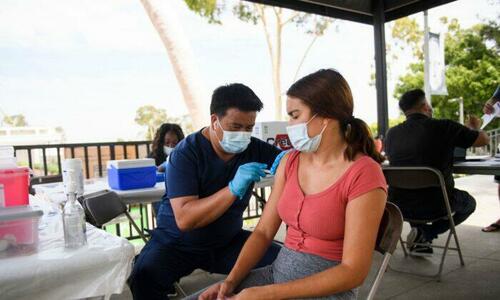
Authored by Zachary Steiber via The Epoch Times (emphasis ours),
Some Americans cannot receive another COVID-19 vaccine dose, U.S. regulators said on April 18, as they made sweeping changes to the vaccine system.
The U.S. Food and Drug Administration (FDA) announced the changes, including replacing the old Pfizer and Moderna vaccines with updated bivalent shots that had previously only been available as boosters.
Regulators are also scaling back the number of recommended doses for most individuals, including people who haven’t received a shot.
Key changes include:
-
Most unvaccinated Americans are still being encouraged to get a COVID-19 vaccine but only need a single dose of a bivalent, the FDA said. The exception is young children. Children aged 6 months through 5 years can receive two doses of Moderna’s bivalent while those aged 6 months through 4 years can get three doses of Pfizer’s bivalent.
-
Americans who have received a primary series of a COVID-19 vaccine and one of the bivalent boosters still cannot get an additional dose, unless they’re in certain groups.
-
Any individual 65 years old or older can receive a bivalent dose, even if they’ve already received one, provided four months or more has elapsed since their last shot.
-
People aged 5 and older and deemed immune compromised can get another bivalent at least two months after their last shot, even if it was a bivalent, and can get additional doses “at the discretion of, and at intervals determined by, their healthcare provider.”

Little Data to Support Bivalents
The FDA authorized the original vaccines in late 2020 based on clinical trial efficacy data. The original vaccines targeted the Wuhan virus strain, which hasn’t circulated since 2020.
The updated bivalents target the Wuhan strain and the BA.4 and BA.5 subvariants of the Omicron strain. The subvariants were displaced in 2022.
Regulators authorized the bivalents as boosters in 2022 despite no clinical trial data being available. In letters formally announcing the bivalents as replacing the old vaccines, the FDA made clear that scientists aren’t sure whether the bivalents protect against COVID-19.
“Based on the totality of the scientific evidence available, FDA concluded that it is reasonable to believe that Pfizer-BioNTech COVID‑19 Vaccine, Bivalent may be effective in individuals 6 months of age and older for the prevention of COVID-19,” the letter to Pfizer states. The same language was used for Moderna’s shot.
Most of the data supporting Pfizer’s expanded authorization comes from the old vaccines and a bivalent that has never been used in the United States. The only trial data for the available bivalent showed that children had higher levels of neutralizing antibodies when they received a bivalent. Antibodies are thought to protect against COVID-19.
Read more here...
Authored by Zachary Steiber via The Epoch Times (emphasis ours),
Some Americans cannot receive another COVID-19 vaccine dose, U.S. regulators said on April 18, as they made sweeping changes to the vaccine system.
The U.S. Food and Drug Administration (FDA) announced the changes, including replacing the old Pfizer and Moderna vaccines with updated bivalent shots that had previously only been available as boosters.
Regulators are also scaling back the number of recommended doses for most individuals, including people who haven’t received a shot.
Key changes include:
-
Most unvaccinated Americans are still being encouraged to get a COVID-19 vaccine but only need a single dose of a bivalent, the FDA said. The exception is young children. Children aged 6 months through 5 years can receive two doses of Moderna’s bivalent while those aged 6 months through 4 years can get three doses of Pfizer’s bivalent.
-
Americans who have received a primary series of a COVID-19 vaccine and one of the bivalent boosters still cannot get an additional dose, unless they’re in certain groups.
-
Any individual 65 years old or older can receive a bivalent dose, even if they’ve already received one, provided four months or more has elapsed since their last shot.
-
People aged 5 and older and deemed immune compromised can get another bivalent at least two months after their last shot, even if it was a bivalent, and can get additional doses “at the discretion of, and at intervals determined by, their healthcare provider.”

Little Data to Support Bivalents
The FDA authorized the original vaccines in late 2020 based on clinical trial efficacy data. The original vaccines targeted the Wuhan virus strain, which hasn’t circulated since 2020.
The updated bivalents target the Wuhan strain and the BA.4 and BA.5 subvariants of the Omicron strain. The subvariants were displaced in 2022.
Regulators authorized the bivalents as boosters in 2022 despite no clinical trial data being available. In letters formally announcing the bivalents as replacing the old vaccines, the FDA made clear that scientists aren’t sure whether the bivalents protect against COVID-19.
“Based on the totality of the scientific evidence available, FDA concluded that it is reasonable to believe that Pfizer-BioNTech COVID‑19 Vaccine, Bivalent may be effective in individuals 6 months of age and older for the prevention of COVID-19,” the letter to Pfizer states. The same language was used for Moderna’s shot.
Most of the data supporting Pfizer’s expanded authorization comes from the old vaccines and a bivalent that has never been used in the United States. The only trial data for the available bivalent showed that children had higher levels of neutralizing antibodies when they received a bivalent. Antibodies are thought to protect against COVID-19.
Read more here…
Loading…




